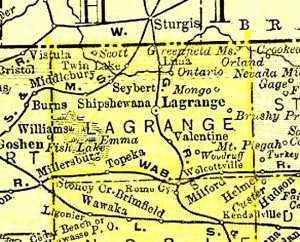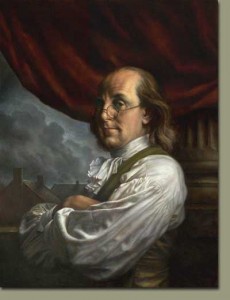No.
 If you can trust historians, however, my great-great grandfather was a self-made man. Zopher Case (yes, that was his real name — the nearly-biblical spelling was real, too) received the following treatment in the 1882 History of LaGrange County, Indiana: “Mr. Case is representative of the self-made man. He began with nothing, at the age of twelve, working for $3.00 per month. By labor and economy, he has acquired one of the largest and finest stock farms in the county, and at present owns 800 acres, having given the remainder to his children.”
If you can trust historians, however, my great-great grandfather was a self-made man. Zopher Case (yes, that was his real name — the nearly-biblical spelling was real, too) received the following treatment in the 1882 History of LaGrange County, Indiana: “Mr. Case is representative of the self-made man. He began with nothing, at the age of twelve, working for $3.00 per month. By labor and economy, he has acquired one of the largest and finest stock farms in the county, and at present owns 800 acres, having given the remainder to his children.”
But I’m here to tell you that you shouldn’t trust historians.
Wait a minute. Don’t trust me when I say you shouldn’t trust historians.
Anyway, my point is that the LaGrange County historian may have gotten the facts right, but the idea of the “self-made man” is a flawed concept. Zopher Case was not a self-made man.
We Americans sure like the idea. We have embraced it ever since Benjamin Franklin wrote an autobiography that explained how he accomplished everything through his own wits, hard work and moral character. And the idea is still alive and well today. A few years ago I noticed the following inspirational poster on the wall of a middle school: “Everything a person achieves and everything they fail to achieve is a direct result of their own thoughts.” There it is.
This idea is flawed because it is based on bad theology and bad theology does not reflect how the world really works. It is flawed because the “self-made man” completely discounts the idea that God might be at work amidst human activity.
How was God at work in the life of Zopher Case? What does God have to do with his economic status? Most American evangelicals would probably try to answer that by looking for characteristics of his spiritual life. Was Zopher Case inspired by God to work hard? Did God help him through the tough times? Did Zopher flourish because he grew in Christian discipleship?
Those are good questions, but I would like to draw our attention to something else. Consider the birth of Zopher Case, an event that stems from God’s creational activity.
What did Zopher Case do to get himself born in 1816 in Ashtabula County, Ohio, twenty years before he moved to Indiana? He did not earn that birth through hard work, wits, high moral character, intelligence or “labor and economy.” Furthermore, had he been born as a black man or an Indian or a woman, his opportunities would have been very different. While I am sure that ol’ Zopher worked hard, he did not begin with nothing. He was born with economic, familial and cultural resources that many others did not have.
For instance, what if Zopher Case had been born in Suipacha, Argentina in 1816? (Disclaimer: I actually do not know a thing about Suipacha except that it is a town outside of Buenos Aires.) From the colonial era through independence and up to the present, small classes of wealthy elites have owned most of the land in just about every country of Latin America. One family in Argentina in the 19th century owned 1.6 million acres of prime land – that’s bigger than the state of Delaware. Another family in Mexico in 1848 owned 16 million acres, a piece of land about the size of South Carolina. Right after independence, a group of 500 individuals in Argentina owned 21 million acres, which is about the size of Indiana. If Zopher Case were born in 1816 in Suipacha to a family of modest means, it is very likely that he would have ended his life as a hired hand on a ranch, without any land to his name. Furthermore, it is likely the same fate would have been true for his son, Riley C. Case, and his son, Riley L. Case, and his son, Riley B. Case and his son, Jay Riley Case. (Apparently, my family found “Riley” to be a comfortable and reliable name. They must have been spooked by “Zopher.”)
But Zopher Case was born in Ohio and moved to LaGrange County, Indiana when he was twenty. He was able to buy land there.
I have benefited economically from Zopher’s efforts. My grandfather grew up on that farm. The prosperity of the farm and the educational opportunities of LaGrange County (we also often forget that none of us earned or paid for our primary school education) enabled my grandfather to get a college education at Purdue University in 1914. He used that degree to become a high school principal and then a county extension agent. When the Depression hit, he not only had a steady job, but extra capital, which he invested – and he continued investing through the 1980s. When my grandfather passed away in 1988, his estate passed down to my father and aunts. My parents did not enjoy an especially high income on my father’s salary as a Methodist minister, but they then found themselves with a fair amount of capital. So when I entered graduate school in 1993, my parents became our banker: they purchased a house in South Bend that our family moved into. We were able to make payments to my parents (enjoying generous terms in the deal) even though my graduate school income technically put my family of five below the poverty line. When we left South Bend six years later, we owned half of the house. We used the capital from that house to buy the house where we now live in North Canton, Ohio.
Meanwhile, about 174 million people in Latin America make less than $2.50/day.
I have worked hard in my life (well, maybe not so much during those junior high years), but I am still not a self-made man. Nor was Benjamin Franklin. Nor are you. For some mysterious reason, God decided where and when you would be born.
What do we do with that reality? More on that in a later post.

